Polycystic Ovarian Syndrome
Polycystic ovary syndrome (PCOS) is the most common hormonal disorder in women, estimated to affect approximately 10% of women of reproductive age.
For women trying to conceive, PCOS is a serious and common cause of infertility – nearly half of all female infertility cases can be attributed to this condition.
Polycystic ovary syndrome can manifest as early as adolescence and may lead to the long-term development of diabetes and cardiovascular disease.
More about Polycystic Ovary Syndrome
If you are of reproductive age, you produce an egg from one ovary each month. This process requires the well-regulated function of a complex hormonal system. If you have polycystic ovary syndrome, your body produces more testosterone and insulin than needed.
This hormonal excess stops the release of eggs from your ovaries, but it does not stop their production. The eggs continue to accumulate in your ovaries. Each egg is housed within a sac, the follicle, where it matures until it is released.
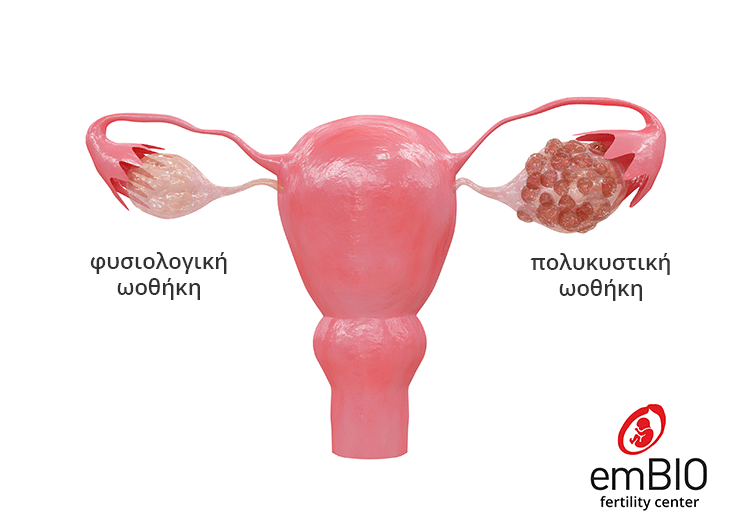
This condition is referred to as polycystic ovaries. When viewed on an ultrasound, the ovaries are usually slightly enlarged and appear to contain multiple small cysts around their periphery. In reality, there are no cysts, only numerous follicles measuring about 0.8 millimeters in diameter.
Symptoms of Polycystic Ovaries
Polycystic ovary syndrome causes different symptoms in every woman. The most common symptoms are:
- acne or oily skin
- hirsutism (excessive hair growth), usually on the face, chest, abdomen, back, or buttocks
- alopecia (patchy or generalized hair loss from the scalp)
- lack of ovulation (and periods)
- irregular menstrual cycles
- weight gain, especially if it is sudden
- insulin resistance (type 2 diabetes)
- infertility
Long-term consequences
Polycystic ovary syndrome can increase the chances of developing various health problems later in life, such as:
- type 2 diabetes due to increased insulin resistance and weight gain
- high blood pressure and high cholesterol – which can lead to heart disease and stroke
- sleep apnea – overweight women may also develop sleep apnea, a condition that causes breathing to stop during sleep
- women who do not have periods or have very irregular periods (fewer than 3 or 4 per year) for many years have an increased risk of developing cancer of the uterine lining (endometrial cancer). However, this risk is small and can be minimized with appropriate treatment.
Psychological impact of polycystic ovaries
The symptoms of polycystic ovaries can be life-altering and may affect a woman's confidence and self-esteem. It can be difficult for a woman to feel good about herself when she is experiencing hair loss, growing excess facial and body hair, and gaining significant weight that she cannot lose. This is often compounded by having no period or a completely irregular cycle.
The psychological effects of this syndrome include:
- mood swings
- low self-esteem
- poor self-image
- anxiety
- depression
Free Online Consultation with Dr Thanos Paraschos and his team
Treatment of Polycystic Ovaries
New medical data on the disease have led to treatment options, which include ovulation-inducing drugs that reduce insulin (clomiphene, metformin), dietary changes (low-glycemic diet), and surgery (ovarian drilling). In detail:
- weight loss and a healthy, balanced diet can improve some symptoms and reduce insulin resistance. Avoid processed foods and sweets, and consume large amounts of fiber (vegetables, legumes, fruits, whole grains). Try to incorporate moderate aerobic exercise into your daily routine, such as a long walk.
- medications are available to treat symptoms such as excessive hair growth, irregular periods, and fertility problems.
- there are also medications for diabetes, high blood pressure, or high blood cholesterol.
- laparoscopic ovarian drilling is a simple surgical procedure that removes the ovarian tissue that produces testosterone. Laparoscopic ovarian drilling is recommended when medication does not produce the desired result. This procedure has been found to reduce levels of testosterone and luteinizing hormone (LH) and increase levels of follicle-stimulating hormone (FSH).
Infertility and pregnancy
The treatments above have proven successful, allowing many women to overcome polycystic ovary syndrome and conceive naturally, while also reducing the risk of miscarriage.
For women who undergo treatment for polycystic ovary syndrome but are still unable to conceive naturally, in vitro fertilization (IVF) offers the best chance of conception.
Images of polycystic ovaries
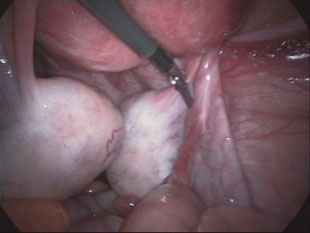
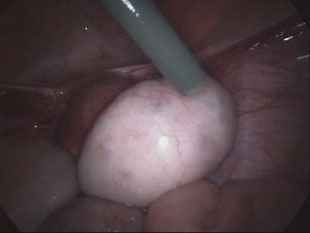
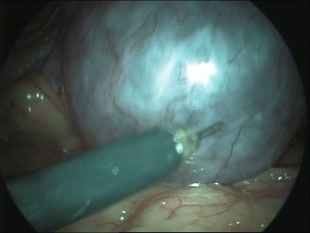
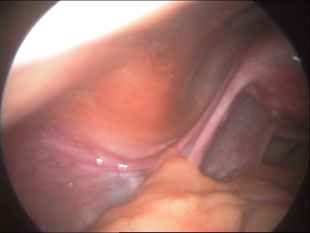
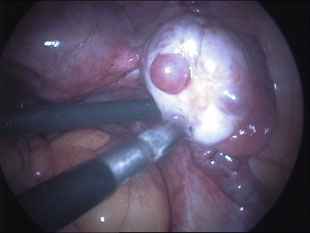
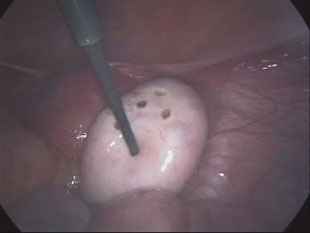
Do we know the cause of polycystic ovary syndrome?
The cause of PCOS is not yet known, but it appears to run in families. If there are women in your family with polycystic ovary syndrome, such as your mother, sister, or aunt, then your risk of developing it is increased. This suggests there may be a genetic link to PCOS, although specific genes related to the condition have not yet been identified.
The symptoms of the syndrome are related to elevated hormone levels, mainly testosterone and insulin.
- Insulin is a hormone that controls the level of glucose in the blood. If you have PCOS, your body may not be able to use insulin as it should (this is known as insulin resistance). As a result, your blood glucose level becomes too high. To try to lower your blood glucose levels, your body produces even more insulin, and these high levels disrupt the function of the ovaries, causing them to produce more testosterone (a male hormone).
- Testosterone is a hormone produced by the ovaries. If you have PCOS, your ovaries produce much more testosterone than needed. This excess is what causes many of the syndrome's symptoms.
Diagnosis of PCOS
The diagnosis is based on:
- medical history
- physical examination
- laboratory tests.
To correctly diagnose the syndrome, other pathological conditions that present with similar symptoms must be ruled out, such as congenital adrenal hyperplasia, Cushing's syndrome, ovarian tumors, prolactinoma, and thyroid disorders. Specifically, your doctor will:
- ask about your symptoms to rule out other possible causes and will check your blood pressure.
- ask you about irregularities in your period.
- check for excessive body hair or acne problems.
- measure your height and weight and calculate your body mass index (BMI).
- request a series of hormonal tests to determine if the excessive hormone production is caused by PCOS or another hormonal disorder.
- request a blood test to check for diabetes or high cholesterol.
- perform an ultrasound to see if you have an abnormally large number of follicles in your ovaries.
How long does medical follow-up continue?
A patient with PCOS, after undergoing personalized treatment depending on the presence and degree of PCOS characteristics, will continue with systematic monitoring to minimize the risk of the syndrome's long-term consequences.
At EmBIO, our doctors specialize in this common but often misunderstood cause of infertility. We work closely with each patient to understand her specific medical case and personal goals, which may include weight loss, pregnancy, or improving overall health, and we develop a holistic approach to achieve these goals.
Often, the journey to manage polycystic ovary syndrome is not easy and requires a strong commitment from both the patient and the doctor. The Embio team is committed to supporting its patients every step of the way.
Support
Our doctors are among the country's leading experts on polycystic ovary syndrome and share their knowledge and results with the media, patients, and colleagues through articles and interviews, online information, seminars, and ongoing clinical research that results in publications in medical journals. These comprehensive efforts are undertaken with the aim of providing information about new successful treatments and spreading a hopeful message to the millions of women suffering from this disease.
A diagnosis of polycystic ovary syndrome can be upsetting and confusing for many women. The doctors at EmBIO are committed to walking each patient through the diagnosis and treatment plan step-by-step to provide reassurance. However, we realize that sometimes it helps to talk to other women who are going through the same thing as you. Nearly five to ten million women in the United States are affected by polycystic ovary syndrome – you are not alone!

